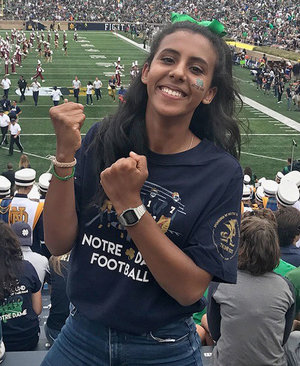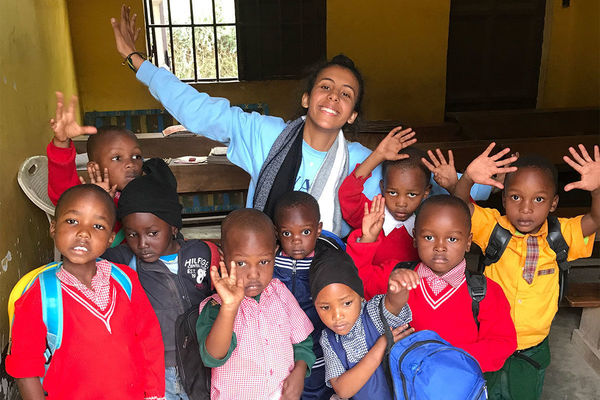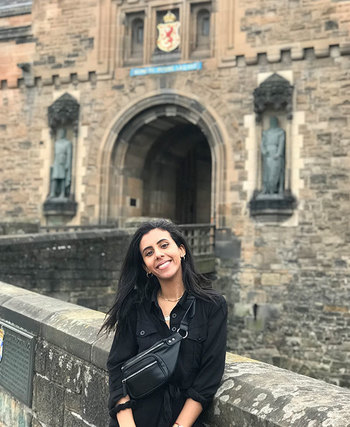
With majors in design and computer science through the Reilly Center Dual Degree Program, Kellogg International Scholar Hind Zahour knew very little about DNA – but she didn’t let that stop her from joining a COVID-19 research team last summer.
When her consulting internship was shortened due to the pandemic, she sought out an opportunity related to the global crisis and was invited to work with Tijana Milenkovic, the Frank M. Freimann Collegiate Associate Professor of Engineering.
Zahour began reading up on gene prediction and network computing in biology and got to work running code to determine what genes are affected by COVID-19 – a process focused on helping to expedite the development of a vaccine.
“It was definitely challenging and outside my comfort zone,” Zahour said. “I had to start from scratch, but I loved that I was working on something that is so important right now for everyone.”
Zahour has always had an interest in the intersection of computer science and biology and was excited to explore the ways computer science can help save lives by processing vast amounts of data quickly.
“By the same token, I am also intrigued by how design thinking can work hand-in-hand with both fields to provide a human-centric approach to maximize their potential,” she said. “My research last summer provided me with answers on the ways different fields can come together and work homogeneously to reach the same end, especially during periods of uncertainty.”
Human-Centered Design
 The tangibility and creativity of her design major and concentration in industrial design through the Department of Art, Art History & Design have become the perfect balance to the technical coding work she does in computer science, and the combination has given her a more holistic way of thinking.
The tangibility and creativity of her design major and concentration in industrial design through the Department of Art, Art History & Design have become the perfect balance to the technical coding work she does in computer science, and the combination has given her a more holistic way of thinking.
“There’s a huge artistic side of design that I really enjoy, and at Notre Dame, we’re very focused on human-centered design,” Zahour said. “It’s not just about designing, it’s about going through the process and thinking about who the customers are and doing research and interviews. The most important thing at the end of the day is the user, and I love that because whether I go into tech or design, I am going to be making something for someone.”
Zahour’s majors offer her different perspectives, but she has discovered a surprising amount of overlap between the two, particularly during a consulting internship with PwC after her junior year.
“PwC uses a lot of design thinking as they’re talking to clients,” Zahour said. “In our training, we went through topics from my design classes like design thinking and how to go about solving an issue. That was so cool to see design being used in cybersecurity.”
Cybersecurity and Counterterrorism
While the field of computational biology was completely new to Zahour, dedicating her time to helping others was not.
A native of Morocco, she has sought solutions to improve the lives of others throughout her Notre Dame career, and was initially drawn to computer science because of an interest in counterterrorism.
“After some tragic events back home in Casablanca, my family and I have been diligent in trying to work with associations for the victims of terrorism there,” Zahour said. “I didn’t want to let go of that coming into college.”
Through the Kellogg International Scholars Program, Zahour also has worked with Kellogg Faculty Fellow Atalia Omer to research peace studies and counterterrorism in North Africa and the Middle East with a focus on the Israel-Palestine conflict.
She began exploring cybersecurity through research with Kellogg Faculty Fellow Nitesh Chawla, the Frank M. Freimann Professor of Computer Science and Engineering – an experience that gave her the technical skills necessary to excel at an internship with Cummins, an engine and generator manufacturer, the summer after her sophomore year.
As a cybersecurity analyst, she wrote a program that decreased the time it took Cummins to trace a cybersecurity attack from hours to under 10 seconds.
Accessible Education
As Zahour finishes the fourth year of the five-year dual-degree program, she’s unsure if she’ll pursue a cybersecurity career or one that combines her two fields of study. But she is certain about one long-term goal – starting a school in North Africa.

Zahour, who is also a Hesburgh-Yusko Scholar, was accepted into a two-year program at the African Leadership Academy in Johannesburg, South Africa, when she was 16. Inspired by her experiences there, she wants to someday establish a similar school in North Africa.
“When I used to go to South Africa the whole journey took nearly two days,” she said. “People shouldn’t have to travel that far for a good education. I think education should be accessible to everybody.”
To gain a better understanding of the educational system in different parts of the African continent, Zahour received funding from Hesburgh-Yusko to teach computer science and math in Tanzania after her first year.
“It was my favorite summer,” she said. “I loved teaching students and creating a curriculum. I also realized how different the educational system is in East Africa compared to the north – the culture, the way students learn, and the way they are examined.”
‘Embrace That Difference’

Tanzania wasn’t Zahour’s first experience with teaching, though. When she studied abroad at Dublin City University, she tutored two immigrant students in math and physics. And since her first year at Notre Dame, she has been teaching coding to teenage girls through the Girls Who Code student association and is now its vice president.
“It’s very close to my heart because at Notre Dame, and in the world, there aren’t a lot of girls in computer science,” she said. “I’m really passionate about telling girls that they can code and that it’s OK if they’re the only girl in a class full of guys – embrace that difference and make it something powerful.”
As always, Zahour is thinking of how she can expand this experience to those back home in Morocco where there are no coding classes offered for girls. Her aspirations are large, but Zahour is determined to see her goals to fruition.
“I have a to-do list for the next 10 years, and starting a school is on the top of that list,” she said. “What ALA and ND have done for me has made me such a better person. I think every single person needs to have the opportunity to go to school and go through a life-changing experience. I’m definitely going to make it happen.”





